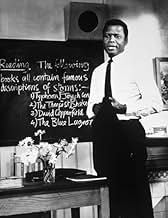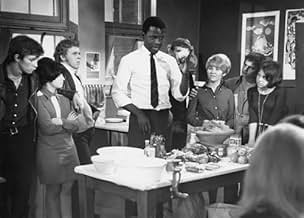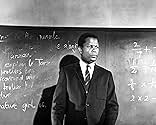Relaciona a experiência de um aprendiz de engenheiro que ensina um grupo de alunos de escolas secundárias brancas de Londres.Relaciona a experiência de um aprendiz de engenheiro que ensina um grupo de alunos de escolas secundárias brancas de Londres.Relaciona a experiência de um aprendiz de engenheiro que ensina um grupo de alunos de escolas secundárias brancas de Londres.
- Direção
- Roteiristas
- Artistas
- Prêmios
- 1 vitória e 3 indicações no total
- Direção
- Roteiristas
- Elenco e equipe completos
- Produção, bilheteria e muito mais no IMDbPro
Avaliações em destaque
The story is about Mr. Thackery (Sidney Poitier) and his seemingly impossible job. While he's a trained engineer, he cannot find work....so he decides to become a teacher...at least until something better comes along. The problem is that he's working with a lot of rough teens--teens who see no future for themselves and who have pretty much given up on amounting to anything. At first, the kids are uncivil...little jerks just biding their time until graduation. However, through the course of the term, his students learn to respect others and themselves...and prove that they might have bright futures.
As I mentioned above, the change in the students is a bit hard to believe if you think about it. But it's still an excellent film....inspiring even. Well worth seeing and filled with some terrific acting, writing and music. And yes, that IS Lulu not only singing the title song but acting as one of Mr. Thackery's students.
I first viewed this film when it was released in 1967, fifty long years ago and the year that I graduated from high school, an institution that was only a notch above the environment of North Quay. For me, this motion picture has actually improved in time, perhaps because I finally understand the words of the East Enders.
The use of the theme song "To Sir With Love" with all of its variations to match the mood of the moment was very successful. The montage sequence of still shots at the museum was also very effective, especially when one considers that the museum management refused to allow the crew from rolling their cameras inside. Talk about turning lemons into lemonade.
Two major instances of irony left a strong impact on me. The first was that of a highly educated black man teaching a predominantly white, underprivileged group of working class students in the inner city. The second was the sight of Sidney Poitier, who played one of those underprivileged students in a New York City high school twelve years earlier during "Blackboard Jungle", standing in front of a similar class as the teacher. In both movies, the teachers were faced with the same, difficult choice of leaving their troubled schools for careers elsewhere.
Although the subject of race arose with great restraint on several occasions during the movie, it did not bluntly expose itself until the moment when the mostly white students were asked to deliver flowers to the home of a bereaved non-white classmate. This was a moment of truth that was handled very well with a very moving and gratifying result.
Although several other reviewers don't agree with me, this is a film which has withstood the test of time. Thanks to the outstanding performance of "Sir" Sidney Poitier, an excellent script, a very capable, British supporting cast, and overall direction by James Clavell that kept me involved in the action from start to finish, this is a very appealing movie that must be seen.
Regrettably, there seems to be a shortage of this type of film, and I dare say that kids today are probably unfamiliar and unable to appreciate this type of product. Why do I think this? Maybe those kids are raised with the non-stop accompaniment of digital effects in every commercial and tv shows and would frankly not have the patience or introspection necessary to enjoy the film. Maybe they see it strictly as a 1967 period piece, which it isn't, because they lack a real understanding of how fine stories and emotions can be told in any time period. Anyhow, what a great movie.
1967: If one actor ever exemplifies the groundbreaking aspect of this year, it certainly is Sidney Poitier, by starring in three films that paved the way for a new depiction of African- American people: "Guess Who's Coming for Dinner", Best Picture nominee and "In the Heat of the Night", Best Picture Winner; and if not in the same vein, "To Sir, With Love" conveys the same kind of inspirational message through the struggle of a man facing alone a hostile group and ultimately defeating intolerance and prejudices. I will never say that Sidney Poitier plays the 'same character' as a reproach but as a tribute to his talent and his brilliance for never having fallen in the trap of stereotypes, to play elegant, distinguished and soft-spoken middle-aged men. He might not be the most versatile actor in the world, but like such stars as Humphrey Bogart or James Stewart, he's perfect within his personal range.
So, after playing a doctor and a police officer, two noble professions to say the least, it's almost natural that Poitier embodies the noblest and most idealistic of all the vocations in "To Sir, With Love" as Mark Thackeray, a teacher and engineer-trainee affected in a high school located in the slums of London's East End, facing a classroom of white students whose racism can be forgiven in the name of ignorance and because it's obviously a wall that can be broken with some efforts. It's up to Thackeray to educate them before their entrance in the adult world. As I said, Thackeray reminds so much of the characters Poitier played in 1967 that the film can be regarded as the third of an unofficial trilogy, whose only theme would be the eye- opening experience of a black man, victim of prejudices, and the ultimate triumph of tolerance and human spirit. I'm not a fan of 'big words' but put in their context, these films were not only significant but necessary to educate some viewers, and it's quite fitting that Poitier incarnates here, a teacher.
Before "To Sir, With Love", only two movies impacted the spirits about the value of an exceptional teacher, "Goodbye, Mr. Chips" and "Blackboard Jungle", starring Poitier too as a good-hearted hoodlum, there where other films of course but "To Sir, With Love" can still be regarded as a pioneer on the subject even more interesting because it was made in 1967, a year where the baby-boom generation stood up against the establishment and the system, holding the red, the green or the rainbow flag. But what struck me in "To Sir, With Love" is that the film avoids these clichés and portrays a group of kid who're too practical to be just rebels without a cause. Ultimately, they are not kids learning about discipline, but about life, sex, marriage, employment, being a man and being a woman. Thackeray can appear as old- fashioned but he addresses a youth that can respond to his lessons, especially because he reflects the very attitudes and behavior he 'preaches' to his students.
There's no room for clichés in "To Sir, With Love", it's not the chronicles about rebellion as a sickness that can be cured by education, only the journey of a teacher who'll reconcile a bunch of misfits with society. Of course, Thackeray's struggles will earn him the hostility of some elements, but inculcating trust, understanding and communication is a process that demand patience, and a moral strength to overcome the most difficult obstacles with calm and empathy. The key is respect, politeness, a capability for admitting faults or reacting in extreme situations. Three pivotal moments will punctuate Thackeray's journey, the culminating incident where he'll finally understand what matters the most for these kids is less theory and more practicality, a visit in the museum, and the ultimate confrontation with one of them. From all these situations, Thackeray will turn out to be one hell of a teacher, too perfect to be believable if Sidney Poitier didn't play him.
Despite some obvious subplots, like the cute girl having a crush on him or some clumsy displays of racism by a colleague, the film keeps a certain complexity in Poitier's character, who disorients his own students. "You're like us, and not like us", says one of them, which is probably the greatest compliment a teacher could receive, above the students enough to teach them but not too much, so he also can understand them. And through his experience, even Thackeray learns one thing or two about teaching, and about his very purpose in life. And I wouldn't be surprised to know that "To Sir, With Love" encouraged many vocations. Now, the film is not perfect, some details like the students wearing the same clothes every day betray its low budget, but I was in fact touched by the film's modesty and I guess the film was counting on the emotional pay-off of the ending that redeemed all these little things that didn't work, and I reckon the sight of Poitier almost bursting to tears after hearing one of the most beautiful cinematic farewell songs cut straight to my heart.
Indeed, "To Sir, With Love" is also this beautiful melody that carries all the positive aspects of the film, and I will never believe how this never got nominated to the Oscar for Best Original Song ("Talk like an Animal"? Give me a break), another mystery like Poitier not having an Oscar nomination in 1967 (although it was a strong line-up that year) doesn't matter, "To Sir, With Love" is a beautiful film, carried by a superb performance from one of the last living icons.
Você sabia?
- CuriosidadesThe film did so unexpectedly well in the States that Columbia Pictures did market research to find out why so many people had gone to it. Their answer: Sidney Poitier.
- Erros de gravaçãoThe students in the class, most of the teachers at the school, and the vendors at the fruit and vegetable market wear the same clothes throughout the movie.
However, it is possible the students, are wearing the same clothes because their families cannot afford more than one set of clothing. During the funeral and museum outing scenes, some of the class are dressed differently, showing they have special clothes and school clothes. As for the vendors, it's possible they have specific clothes to wear to work in, whether or not for financial reasons.
- Citações
Mark Thackeray: [entering classroom and seeing smoke] All you boys, out. Girls stay where you are. Out.
[closes door]
Mark Thackeray: I am sick of your foul language, your crude behavior and your sluttish manner. There are certain things a decent woman keeps private, and only a filthy slut would have done this and those who stood by and encouraged her are just as bad. I don't care who's responsible - you're all to blame. Now, I am going to leave this room for five minutes by which time that disgusting object had better be removed and the windows opened to clear away the stench. If you must play these filthy games, do them in your homes, and not in my classroom!
- Cenas durante ou pós-créditosLulu received an "introducing" credit.
- ConexõesFeatured in Hollywood U.K. British Cinema in the Sixties: A Very British Picture (1993)
- Trilhas sonorasTo Sir, With Love
Lyrics by Don Black
Music by Mark London (as Marc London)
Performed by Lulu (uncredited)
Arranged and Conducted by Mike Leander (uncredited)
Principais escolhas
Detalhes
- Data de lançamento
- País de origem
- Idioma
- Também conhecido como
- Al maestro, con cariño
- Locações de filme
- Empresas de produção
- Consulte mais créditos da empresa na IMDbPro
Bilheteria
- Orçamento
- US$ 640.000 (estimativa)
- Faturamento bruto mundial
- US$ 642
- Tempo de duração1 hora 45 minutos
- Mixagem de som
- Proporção
- 1.85 : 1
Contribua para esta página




































